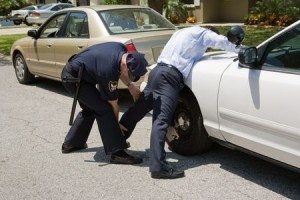The Fourth Amendment and criminal law protects against unreasonable searches and seizures. It protects owners from unreasonable searches of themselves, their property and other effects. Unreasonable search and seizure is one that occurs without a warrant. The warrant must state with particularity who, what and where the search is to take place. The primary idea behind the fourth amendment is to make citizens secure in their right to privacy and unreasonable seizures.
and other effects. Unreasonable search and seizure is one that occurs without a warrant. The warrant must state with particularity who, what and where the search is to take place. The primary idea behind the fourth amendment is to make citizens secure in their right to privacy and unreasonable seizures.
Fourth Amendment:
For the Fourth Amendment to protect against unreasonable search and seizure, an actual expectation of privacy must exist. That expectation of privacy must be reasonable. This is both subjective and objective in application. Moreover, the expectation must be a legitimate or reasonable expectation of privacy. Further society must prepare to recognize it as reasonable or legitimate.
This protects the citizens from unreasonable searches and seizures. It also allows the law enforcement agencies to conduct their jobs within conformity of justice. For instance, there is no reasonable or legitimate expectation of privacy in the numbers that a person dials on a telephone thus preventing the fourth amendment to protect against unreasonable searches and seizures. Also, the courts have held that sense enhancing surveillance of a defendant through a radio transmitter does not constitute a Fourth Amendment search when all that was tracked with the use of the radio transmitter could have also been tracked by the naked eye on the street.
Limitations of the 4th amendment:
Assumption of the Risk:
Fourth amendment and criminal law does not extend to what a person exposes to a third party due to the assumption of the risk doctrine. Essentially, this means what a person exposes to the public or to a third party, is no longer private. Even if this person wanted to keep this thing private, by sharing it they assumed the risk of exposure.
Confidential Informants:
Fourth amendment protection does not extend to a wrongdoer’s misplaced belief of confidentiality in a person to whom he or she voluntarily confides his or her wrongdoing activity will not reveal it. The constitution does not protect against unreasonable searches and seizures when the Government sends to the defendant’s home a secret agent who conceals his identity and makes a purchase of narcotics from the accused. Fourth amendment does not protect a defendant when the agent, unknown to the defendant, carries electronic equipment to record the defendant’s words and the evidence so gathered is later offered in evidence.
Search and Seizure Based on Drug Sniffing Dog:
A Canine sniff by a well-trained narcotics detection dog will not constitute an unreasonable search. The search does not require the opening of luggage or personal belongings. Further, a dog sniff search is less invasive than the typical police search. It can also be quite informative in detecting the presence of contraband. Since individuals do not have a right of privacy to contraband, contraband searches occur with less constitutional protection than most other items. Further, we do not have a legitimate or reasonable expectation of privacy in the odors emanating from our suitcases or personal belongings. Thus, if a law enforcement agent detects pungent odors, there is not reasonable expectation in such privacy.
Illegal Search Criminal Defense Attorney:
If you need a criminal defense attorney we can help. Moreover, if the arrest was due to an illegal search you may have certain defenses. Our forth amendment criminal law attorneys have assisted countless clients throughout the state of Oklahoma. If you receive charges due to a warrant-less search, know your rights.
Tulsa's Local Criminal Defense Lawyers
 Are you looking for Tulsa attorneys who will fight aggressively for you? Our team of criminal defense attorneys have the experience needed in Oklahoma law to secure the outcome you deserve.
Are you looking for Tulsa attorneys who will fight aggressively for you? Our team of criminal defense attorneys have the experience needed in Oklahoma law to secure the outcome you deserve.
Call us today for a free consultation 918-743-2233 or contact us online.

